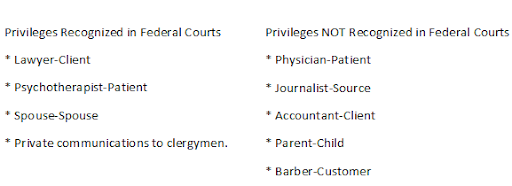Overview | Clinical Scenarios | References
By Jacob M. Appel, MD, JD
OVERVIEW
Definition
Privilege is the right to withhold certain types of confidential information and testimony from the legal system. (Confidentiality, in contrast, is a broader term that refers to a professional norm, codified into law by HIPAA and other rules, that prevents the general disclosure of personal healthcare information.) In various jurisdictions, privilege applies to private communications with attorneys, priests, physicians, psychotherapists and spouses. The privilege is said to be “held” by the patient as the patient can prevent the provider’s testimony but the physician generally cannot.
Federal law
- In the case of Jaffe v. Redmond (1996), the United States Supreme Court applied the psychotherapist-patient privilege to the federal court system.
- There is no independent physician-patient privilege in the federal courts.
State law
- Nearly all states courts also guarantee psychotherapist-patient privilege and many apply the rule to all physicians.
Context
- Psychotherapist-patient and physician-patient privilege arise both in criminal prosecutions and civil lawsuits.
- The privilege rule generally does not apply when the legal matter is one in which the physician or therapist is herself a party, such as malpractice litigation.
- The rule only applies to private communications.
When must provider testify?
- Some states allow testimony if the statement is also heard by a translator or another hospital employee; in all jurisdictions, if a bystander (e.g., relative or friend) is present, the privilege no longer applies.(2)

CLINICAL SCENARIOS & HOW TO ADDRESS
Scenario #1: A defendant is injured during the course of committing a crime and explains to his physician how he was injured. The physician later receives a subpoena to testify to the contents of this exchange. Can the physician testify to this in court?
- Physicians and therapists may receive a subpoena requiring either testimony (either at a deposition or trial) or the provision of records.
- In response, the provider should first contact the patient to inform him of the request for evidence as the patient may have no objection to the physician providing the documents or testimony to the courts.
- If the patient objects to sharing the information on the grounds of privilege, the provider should consult with legal counsel to determine the steps to assert the right.
- Under no circumstances should a valid subpoena be ignored.(1)
- If privilege applies, the physician cannot reveal this information during testimony without the patient’s permission.
Scenario #2: In a divorce suit, a spouse attempts call the other spouse’s therapist to the stand to testify to the contents of their sessions. Can the therapist be compelled to do so?
- Special protections are afforded both the contents of psychotherapy and psychotherapy notes.
- Psychotherapy notes should be stored separately from routine progress notes, forms and billing information as, under federal confidentiality laws, greater privacy protections apply to the former.
- If the patient-spouse asserts privilege, the therapist cannot testify.
- If the patient-spouse does not object, the therapist may be compelled to testify and disclose records.
REFERENCES
- “Confidentiality and Testimonial Privilege” in Schouten R, ed. Mental Health Practice and the Law. New York, NY: Oxford University Press. Available at: https://oxfordmedicine.com/view/10.1093/med/9780199387106.001.0001/med-9780199387106-chapter-9
- Leonard DP, Gold VJ. Evidence: A Structured Approach, 2d ed., (Aspen, 2004)
Additional Reading
- Mueller, Christopher B. and Kirkpatrick, Laird C. and Richter, Liesa, §5.35 Psychotherapist-Patient Privilege (2018). C. Mueller, L. Kirkpatrick, & L. Richter, Evidence §5.35 (6th ed. Wolters Kluwer 2018); GWU Law School Public Law Research Paper No. 2018-68; GWU Legal Studies Research Paper No. 2018-68. Available at SSRN: https://papers.ssrn.com/sol3/papers.cfm?abstract_id=3277054
- Jaffee v. Redmond http://cdn.loc.gov/service/ll/usrep/usrep518/usrep518001/usrep518001.pdf
- Naidoo Y, Ciccone JR. Physician–patient privilege. Journal of the American Academy of Psychiatry and the Law Online June 2016, 44 (2) 270-272; Available from: http://jaapl.org/content/44/2/270/tab-article-info

